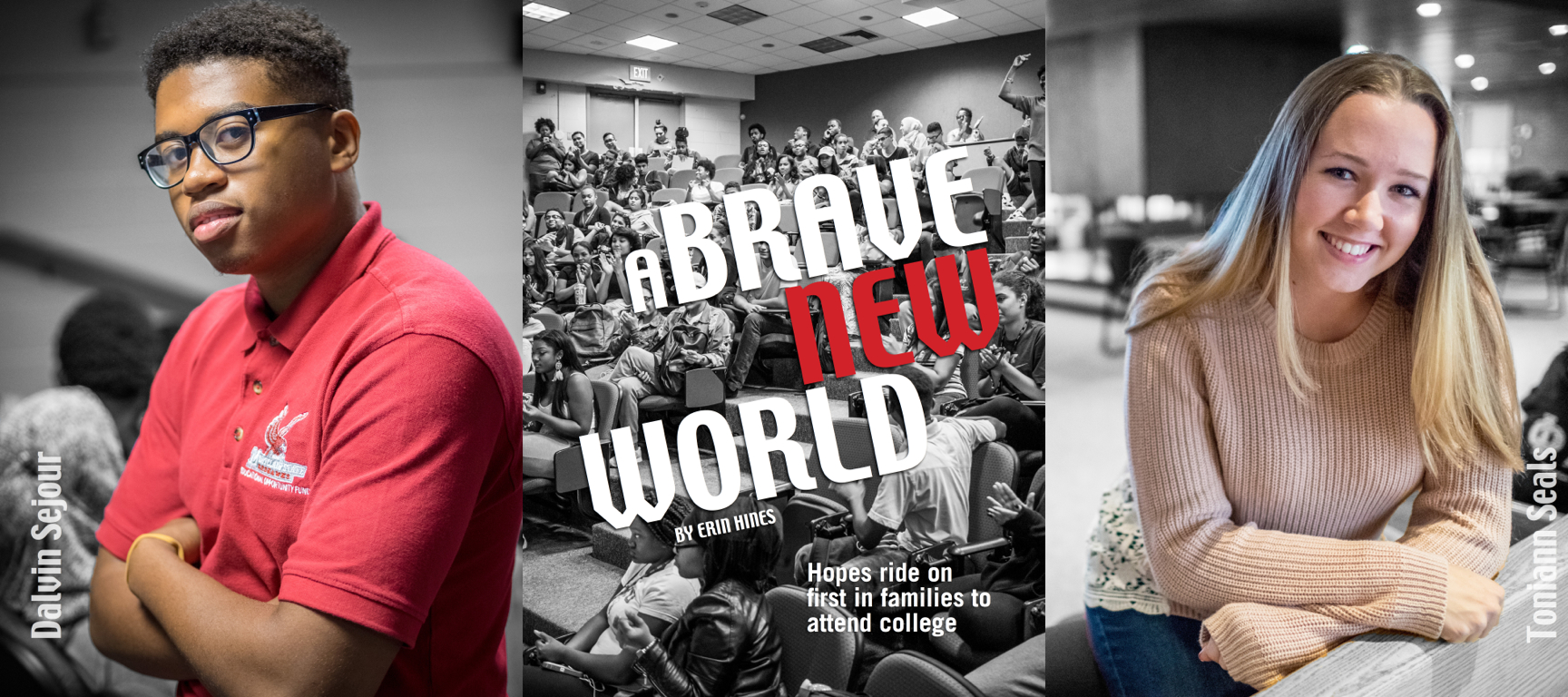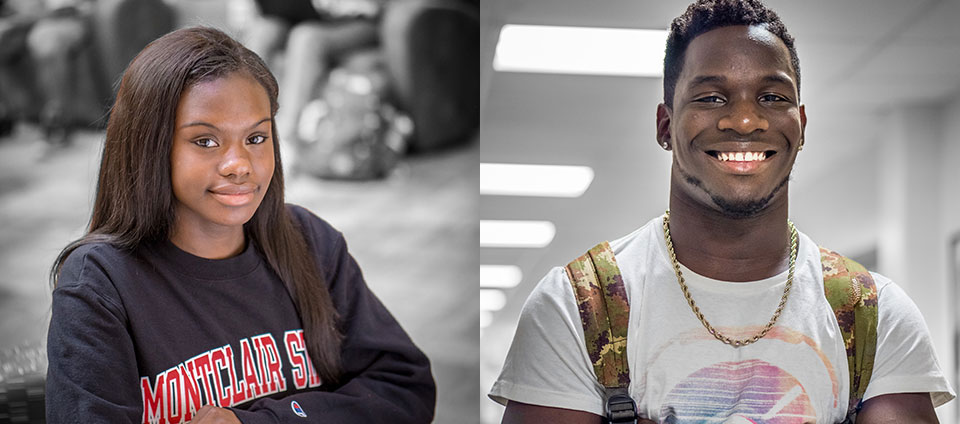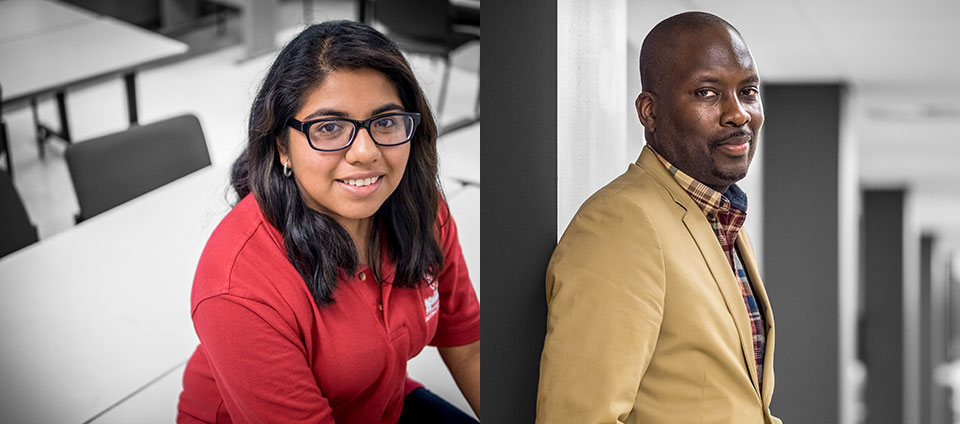A Brave New World

Hopes ride on
first in families to
attend college
by Erin Hines
This past summer, life came full circle for Dalvin Sejour. A sophomore from Irvington, New Jersey, Sejour was a peer leader in the Summer Academy for Montclair State’s Educational Opportunity Fund (EOF), living and working with incoming freshmen. The EOF program aims to level the playing field for less advantaged students, many of whom, like Sejour, are the first in their families to go to college.
The Summer Academy is a rigorous, six-week institute designed to help incoming freshmen adjust to the academic and social demands of college life. A year earlier, against the odds, Sejour was one of those freshmen.
As a baby, Sejour moved to Haiti, where his parents were murdered in a home invasion. He and his older siblings returned to the United States to live with an aunt and uncle. His aunt, a hairstylist and home health aide and his uncle, a janitor and barber, encouraged the children in their studies, hoping it would lead to a better future.
“I got a second chance to live, and I have a purpose in life. My aunt and uncle didn’t get a chance to go to college, so they put it into my head to go,” says Sejour. “I have a lot of people to make proud. That’s my motivation.”
For first-generation college students, motivation – and support – matters. Studies show that they generally have much lower graduation rates and more difficulty succeeding in school. But research also indicates that college programs – such as EOF – are closing that gap and helping more students like Sejour reach their goals.
“These scholars often navigate the college enrollment and financial aid processes alone. There’s pride and anxiety in being the ‘first’ in one’s family to pursue higher education,” says Daniel Jean, executive director of EOF and Academic Development and once a first-generation student himself. “The journey of a first-gen scholar often includes unrealistic expectations of what a college degree guarantees, conflicting expectations with home responsibilities and balancing academics, and difficulty reconnecting with the community once the scholar begins to grow and change. As a first-generation scholar, I experienced all of these.”
A common thread
Roughly 30 percent of Montclair State students are the first in their families to go to college. These students generally share one trait: a strong work ethic, instilled early on. Many have had to work through school assignments and standardized tests without the guidance of parents or guardians or the advantages of tutors and test prep courses.
“I have a lot of people to make proud. That’s my motivation.”
– Dalvin Sejour
Gabriela Galvez’s experience bears that out. Her parents always encouraged her and supported her academic goals, but without advanced schooling themselves (her father had a third-grade education) they were unable to help her with homework from an early age.
“I had to do my work alone. If there was something I didn’t understand, I just had to work at it until I did,” says Galvez, now a junior majoring in public health.
Before she started her first year at Montclair State in 2013, Galvez of Englewood, New Jersey, also participated in the Summer Academy. It was her first time away from home for an extended period of time and it was tough, but the academy helped. “I was really grateful in the fall because I knew where to go and what was expected of me. I had already made some friends and knew who to speak with if I had questions.”
Since then, Galvez has had ups and downs, including dealing with the death of her father, but she has persevered. Now a peer leader like Sejour, she also worked in the Summer Academy, sharing her enthusiasm for her major.
“I know I’m at an advantage because I’ll have my degree,” says Galvez. “I’ll have something I really want to do. I want to go to work and know I’m helping people.”
The right choice
For some first-generation college students, like Toniann Seals, it’s not the transition to college that proves difficult – it’s choosing one.
“It’s not really challenging being the first in my family to attend college,” says Seals, a business administration major from Bayonne, New Jersey. “The hardest part would probably be not having prior experience within my family regarding the application and selection process.”
The youngest of four, Seals’ older siblings attended trade schools for specific careers, she says. “I decided to go to college in order to further my education and hopefully be successful in my dream career.”
Now that she’s here, her family’s encouragement motivates her to succeed.
“My brother has always thought highly of me and I really want to live up to his expectations,” says Seals. “My mom has been there for me since the beginning, and I want to make her proud.”
Freshman Shymirra Grant of Trenton faced similar challenges in applying to and selecting a college. Her mother, a daycare worker, was supportive but not always able to help with homework or the logistics of the applications process. So Grant learned to seek help in class or figure it out on her own, reaching out to teachers and guidance counselors when it came time to apply. Grant, who wants to eventually get a doctorate, realized that Montclair State’s five-year combined bachelor’s and master’s program in psychology was the right fit for her.
The oldest of three children, Grant is also keenly aware of setting an example for her two younger brothers.
“To see someone from your same circumstances succeed empowers you,” says Grant. “I didn’t have that but I found it in myself. My little brothers will have it because I’m showing them that it is possible to go to college.”
Following the path – and leading the way
First-year student Damian Otchere of East Orange is fortunate. He has the benefit of an older sibling’s college experience to help guide his way. His sister graduated just this year from William Paterson University.
“My sister and I are also the first generation born in the U.S. Our parents didn’t graduate from college, but they always stressed the importance of education,” says Otchere, a musical theatre major whose father emigrated from Ghana. “My sister earned her degree, and now I’m going to do the same.”
Like Otchere, Sejour also has a roadmap to follow, thanks to his older sister and brother, both college graduates.
“By attending college, they gave me something to follow and people I can go to if I have questions or need help with something,” says Sejour.
Not all first-generation college students are so lucky. It’s one of the reasons Sejour is eager to encourage others coming up behind him and why he wanted to be
a peer leader. That eagerness helped him land the job at the 2015 Summer Academy – rare for a freshman.
“Dalvin is very disciplined, very focused,” says Jean. “He brings those same qualities to the table as a peer leader.”
Laying the foundation
Except for the application process and increased cost of higher education, the challenges facing today’s first-generation students are similar to those who’ve come before them. Alumnus Mike McCloskey, a 1978 graduate of Montclair State who grew up in Verona, viewed college in practical terms. His father passed away when he was very young, leaving his mother to raise five children alone. Money was tight and going to college was by no means a given.

Shymirra Grant
Damian Otchere
“My mother was supportive, but her concern was always more about what kind of a person you were than whether you went to college. Being a good person was always the most important thing,” recalls McCloskey. “Even though I had older siblings who went to college, it wasn’t on my radar. In high school, I thought about becoming a carpenter. My guidance counselors said my grades were good enough that I should consider college, so I did.”
Since he needed to pay his own way through school, he worked part-time and lived at home, sometimes walking the five miles to campus when his car broke down. “School was like work, and I wanted to do a good job at it,” says McCloskey. “I took it seriously.”
After graduating cum laude with a degree in geoscience, McCloskey worked in the engineering and geotechnical fields before focusing on the environmental business. He currently serves as vice president for the Louis Berger Group Inc.
“My degree opened doors for me,” says McCloskey. “I wouldn’t have been able to achieve my current position without it. That, along with flexibility and a willingness to work hard, has paid off for me.”
Rising out of poverty
Bertha Diggs, associate director of Montclair State’s EOF program, can still remember vividly when she knew she would be the first person in her family to go to college.
“I realized in eighth grade we were very poor, and I made a conscious decision to attend college,” says Diggs, who earned a bachelor’s degree in 1972 and a master’s in ’73. “I decided that life had more to offer, and I wanted more. I also enrolled my sister who was four years younger than me.”

Gabriela Galvez
EOF Director Daniel Jean
Her history teacher helped her get an interview at Glassboro College (now Rowan University) and that was her college search. Though a “B” student in high school, she made Glassboro’s Dean’s List with the support of its EOF program.
Diggs’ hard work, inspired by “the sting of poverty,” paid off. “It allowed me to obtain a degree, and the opportunity for upward mobility became a reality,” says Diggs, who now offers that kind of support to first-generation and other less advantaged students.
Paying it forward
In May, Sejour was chosen as a Fellow for America Needs You – New Jersey, a highly selective mentorship and career development program for first-generation college students.
Grateful for the support he’s receiving, he hopes to encourage others in his Irvington neighborhood, who often lack academic role models.
“It’s kind of setting an example for people in my hometown who didn’t take the same path as me,” he says. “At the end of the day, the investment you make in your education outweighs almost any other investment in your life.”